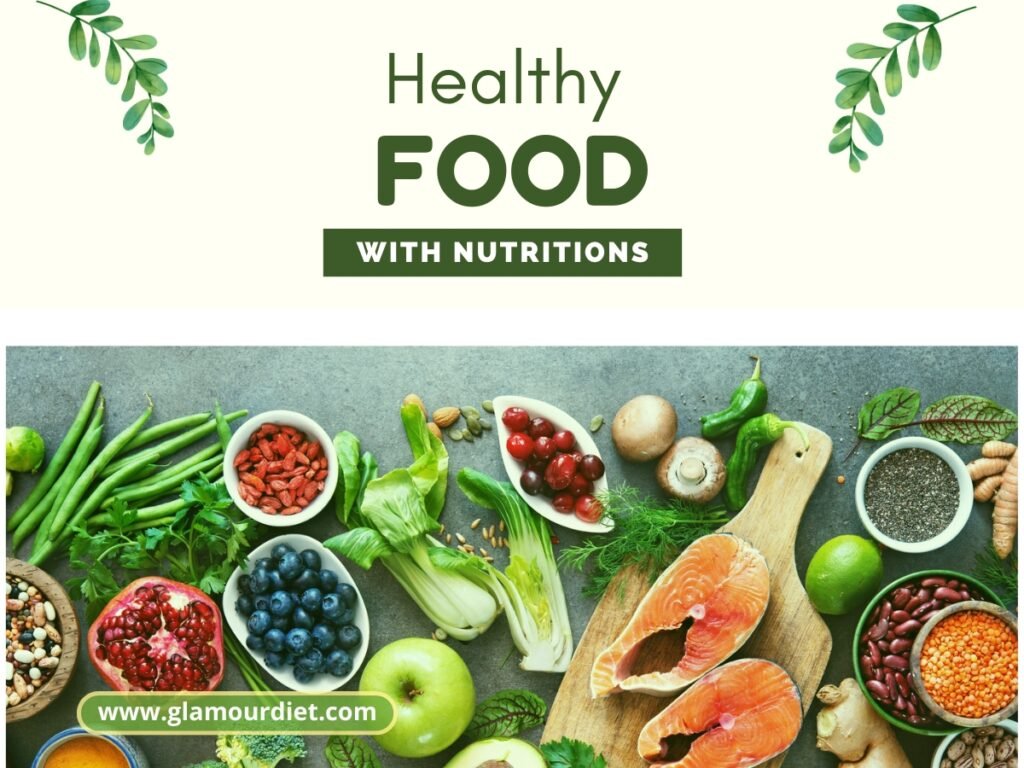Introduction
Nutrition plays a pivotal role in maintaining our health and well-being. However, with so much conflicting information available, it can be challenging to know what to believe.
This article provides 10 essential nutrition facts, supported by research, that can help you make informed decisions about your diet. Understanding these facts will empower you to choose foods that nourish your body and support a healthy lifestyle.
See 10 Facts About Nutrition:
Fact 1: The Importance of Macronutrients
What are macronutrients, and why are they important?
Macronutrients are the nutrients that your body requires in large amounts. They include carbohydrates, proteins, and fats.
Each macronutrient plays a unique and vital role in your body:
- Carbohydrates are the primary energy source. They provide energy to your brain, kidneys, heart muscles, and central nervous system. For example, fiber-rich carbs, such as whole grains and vegetables, help maintain a healthy digestive system.
- Proteins are essential for building and repairing tissues. They also make enzymes, hormones, and other body chemicals. High-quality protein sources include lean meats, poultry, fish, eggs, and plant-based options like beans and lentils.
- Fats are crucial for energy, hormone production, and cell growth. Healthy fats, such as those found in avocados, nuts, and olive oil, are vital for absorbing fat-soluble vitamins (A, D, E, and K).
How can I balance my macronutrient intake?
A balanced diet should include all three macronutrients. The USDA recommends that adults consume 45-65% of their calories from carbohydrates, 10-35% from protein, and 20-35% from fats.
Fact 2: The Role of Micronutrients
What are micronutrients, and why are they important?
Micronutrients, including vitamins and minerals, are essential for maintaining overall health, although they are required in smaller quantities compared to macronutrients. They play a vital role in defending against illness, boosting growth, and improving general well-being.
- Vitamins are organic compounds that regulate metabolism and help convert energy from fat, protein, and carbohydrates. For example, Vitamin C is essential for the growth and repair of all body tissues.
- Minerals like calcium and iron are crucial for bone health and oxygen transport, respectively.
How can I ensure adequate micronutrient intake?
Consuming a variety of fruits, vegetables, lean proteins, and whole grains helps meet your micronutrient needs. Consider supplements if you have specific deficiencies, but consult a healthcare provider first.
Fact 3: The Impact of Fiber on Health
Why is fiber important for your diet?
Fiber is a kind of carbohydrate that cannot be digested by the body. It plays a role in controlling the body’s utilization of sugars, thus assisting in managing hunger and maintaining stable blood sugar levels.
- Soluble fiber has an amazing ability to dissolve in water and form a gel-like material. This superpower helps in lowering blood cholesterol and glucose levels, making it an important part of a healthy diet. Good sources include oats, peas, beans, apples, and citrus fruits.
- Insoluble fiber helps material move through your digestive system and increases stool bulk, which can help with constipation or irregular stools. Whole wheat flour, wheat bran, nuts, beans, and vegetables are excellent sources of insoluble fiber.
How much fiber do you need daily?
The American Heart Association recommends a total dietary fiber intake of 25 to 30 grams per day from food, not supplements.
Fact 4: The Truth About Sugar
How does sugar affect your health?
Excessive consumption of sugar can result in various health issues, such as obesity, type 2 diabetes, and heart disease. Natural sugars found in fruits and dairy are generally not a problem, but added sugars can contribute to health problems.
How can you reduce sugar intake?
Read food labels to watch for added sugars, opt for water instead of sugary drinks, and choose fresh fruits instead of sugary snacks.
Fact 5: The Benefits of Hydration
Why is hydration important?
Water is essential for the proper functioning of every system in your body. It regulates body temperature, lubricates joints, aids digestion, and transports nutrients. Dehydration can lead to fatigue, dry skin, and severe health issues.
How much water should you drink daily?
The National Academies of Sciences, Engineering, and Medicine recommend about 3.7 liters of fluids for men and 2.7 liters for women daily.
Fact 6: The Influence of Gut Health
How does gut health impact your overall well-being?
Your gut microbiome is linked to immune function, mood, and chronic diseases. A balanced gut can improve digestion, nutrient absorption, and even mental health.
How can you maintain a healthy gut?
Include probiotics and prebiotics in your diet. Probiotics are present in fermented foods, like yogurt and sauerkraut. Prebiotics, which nourish good bacteria, are abundant in fiber-rich foods.
Fact 7: Understanding Food Labels
Why are food labels important?
Food labels provide information about the nutritional content of foods, helping you make informed choices. They list calories, macronutrients, micronutrients, and other ingredients.
What information should you seek on a food label?
Check the serving size, total calories, and % Daily Value (%DV) for nutrients like fats, sodium, and added sugars. Aim for a higher %DV of fiber, vitamins, and minerals.
Fact 8: The Impact of Processed Foods
How do processed foods affect your health?
Processed foods often contain high levels of added sugars, sodium, and unhealthy fats, which can contribute to health problems such as obesity and heart disease.
How can you reduce the consumption of processed foods?
Concentrate on consuming whole foods like fruits, vegetables, lean proteins, and whole grains. Make sure to prepare your meals at home to have control over elements and piece sizes.
Fact 9: The Benefits of Mindful Eating
What is mindful eating, is it necessary?
Mindful eating is the practice of living intentionally and carefully while consuming food and beverages, both physically and mentally. It helps prevent overeating, improves digestion, and enhances the overall enjoyment of food.
How can you practice mindful eating?
Eat slowly, savor each bite, listen to your body’s hunger cues, and avoid distractions like TV or smartphones during meals.
Fact 10: The Power of Plant-Based Diets
What are the benefits of a plant-based diet?
A plant-based diet is rich in nutrients, fiber, and antioxidants, which can lower the risk of chronic diseases such as heart disease, diabetes, and certain cancers.
How can you include more plant-based foods in your diet?
Start by replacing one or two meat-based meals per week with plant-based options. Include a variety of fruits, vegetables, legumes, nuts, and seeds in your meals.

The benefits and non-benefits of these 10 facts about Nutrition.
Certainly! Here is an exploration of the benefits and potential non-benefits of the 10 nutrition facts discussed:
Fact 1: The Importance of Macronutrients
Benefits
- Energy Provision: Carbohydrates are essential for energy, especially for brain function and physical activity.
- Tissue Repair and Growth: Proteins are vital for muscle repair and growth, hormone production, and immune function.
- Nutrient Absorption and Cell Health: Fats aid in the absorption of fat-soluble vitamins and provide essential fatty acids for cell membrane health.
Non-Benefits
- Overconsumption: Consuming too many macronutrients, particularly fats and carbohydrates, can lead to weight gain and associated health issues like diabetes and heart disease.
- Nutrient Imbalance: Focusing on one macronutrient over others can result in deficiencies and metabolic imbalances.
Fact 2: The Role of Micronutrients
Benefits
- Disease Prevention: Adequate intake of vitamins and minerals can prevent deficiencies and related diseases, such as scurvy (vitamin C deficiency) or osteoporosis (calcium deficiency).
- Overall Health: Micronutrients support immune function, cognitive development, and energy metabolism.
Non-Benefits
- Toxicity: Excessive intake of certain vitamins and minerals, particularly from supplements, can lead to toxicity. For example, too much vitamin A can cause liver damage and central nervous system disorders.
- Overemphasis on Supplements: Relying heavily on supplements can sometimes lead to neglecting whole food sources of nutrients, which provide additional beneficial compounds like fiber and antioxidants.
Fact 3: The Impact of Fiber on Health
Benefits
- Digestive Health: Fiber improves bowel regularity and helps prevent constipation.
- Blood Sugar Control: Soluble fiber slows sugar absorption, which can help manage blood sugar levels.
- Cholesterol Management: Fiber binds to cholesterol in the digestive system, helping to lower blood cholesterol levels.
Non-Benefits
- Digestive Discomfort: A sudden increase in fiber intake can cause bloating, gas, and abdominal cramps.
- Nutrient Absorption: Excessive fiber intake may interfere with the absorption of certain minerals, such as iron and calcium.
Fact 4: The Truth About Sugar
Benefits
- Quick Energy: Sugars, especially simple sugars, provide a rapid source of energy that can be beneficial in moderation for athletic performance.
- Palatability: A certain amount of sugar can enhance the flavor of foods and improve palatability.
Non-Benefits
- Health Risks: High sugar consumption is linked to obesity, type 2 diabetes, heart disease, and tooth decay.
- Nutrient-Poor: Foods high in added sugars often lack essential nutrients and can displace more nutritious food choices.
Fact 5: The Benefits of Hydration
Benefits
- Optimal Bodily Functions: Proper hydration is crucial for maintaining fluid balance, regulating body temperature, and supporting metabolic processes.
- Physical Performance: Adequate water intake improves physical endurance and reduces fatigue.
Non-Benefits
- Overhydration: Drinking excessive amounts of water can lead to hyponatremia, where sodium levels in the blood become dangerously low.
- Misunderstanding Hydration Needs: The recommended fluid intake varies based on individual factors such as activity level, climate, and health conditions.
Fact 6: The Influence of Gut Health
Benefits
- Immune Support: A healthy gut microbiome boosts the immune system and protects against pathogens.
- Mental Health: Emerging research suggests a link between gut health and mental health, including mood regulation and anxiety.
Non-Benefits
- Misguided Probiotic Use: Not all probiotics are beneficial for everyone. Some may not survive stomach acid, while others might not be appropriate for certain health conditions.
- Overemphasis on Gut Health Products: Relying on marketed gut health products might overshadow basic healthy eating practices.
Fact 7: Understanding Food Labels
Benefits
- Informed Choices: Food labels help consumers make better dietary decisions by providing detailed nutritional information.
- Allergy Safety: Labels provide critical information about potential allergens.
Non-Benefits
- Confusion and Misinterpretation: Misunderstanding or overlooking key information can lead to poor dietary choices.
- Overreliance on Labels: Focusing too much on labels might cause consumers to overlook the overall quality of the food.
Fact 8: The Impact of Processed Foods
Benefits
- Convenience and Accessibility: Processed foods can offer convenient options and longer shelf lives, important for food security.
- Nutrient Fortification: Some processed foods are fortified with essential nutrients, helping to prevent deficiencies.
Non-Benefits
- Health Risks: Many processed foods are high in added sugars, unhealthy fats, and sodium, contributing to chronic diseases.
- Reduced Nutrient Density: Processing can strip foods of beneficial nutrients and phytochemicals.
Fact 9: The Benefits of Mindful Eating
Benefits
- Improved Digestion: Paying attention to the eating process can enhance digestive efficiency.
- Weight Management: Mindful eating promotes a healthy relationship with food and helps prevent overeating.
Non-Benefits
- Time-Consuming: It can be challenging to uphold mindful eating practices, particularly in fast-paced lifestyles.
- Potential for Overthinking: Overemphasis on every bite could lead to anxiety about food choices.
Fact 10: The Power of Plant-Based Diets
Benefits
- Nutrient-Rich: Plant-based diets are rich in fiber, vitamins, minerals, and antioxidants, contributing to lower risks of chronic diseases.
- Environmental Impact: Shifting towards plant-based diets can reduce the ecological footprint and promote sustainability.
Non-Benefits
- Potential Deficiencies: Plant-based diets may lack nutrients such as vitamin B12, iron, and omega-3 fatty acids if not carefully planned.
- Social and Cultural Challenges: Adopting a plant-based diet can be challenging in certain social or cultural settings that prioritize animal-based foods.
In conclusion, understanding the benefits and limitations of each nutrition fact is crucial for tailoring dietary choices to your individual needs and lifestyle. Balancing these insights can lead to a well-rounded approach to nutrition, fostering both short-term wellness and long-term health.
Conclusion
Understanding these 10 nutrition facts can significantly impact your eating habits and overall health. By incorporating this knowledge into your daily routine, you can make more informed choices that promote well-being and longevity. Remember that making small, consistent changes can lead to substantial health benefits over time.
FAQs
Q: How can I tell if I’m getting enough micronutrients?
A: Regular blood tests can help determine if you’re deficient in any micronutrients. Additionally, a balanced diet rich in fruits, vegetables, lean proteins, and whole grains can ensure adequate intake.
Q: Are all fats bad for you?
A: No, not all fats are bad. Unsaturated fats found in avocados, nuts, and fish are beneficial for heart health. Trans fats and excessive saturated fats should be limited for heart health.
Q: Can drinking more water improve my skin?
A: Yes, proper hydration can help maintain your skin’s elasticity and combat dryness. However, it’s not a cure-all; a balanced diet and adequate skincare are also essential.
Q: How does mindful eating help with weight loss?
A: Mindful eating encourages listening to your body’s hunger and fullness cues, which can prevent overeating and promote weight loss.

